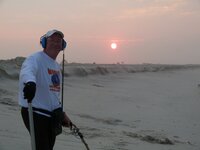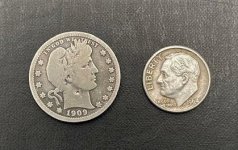Golden oaks
Full Member
- Aug 4, 2012
- 146
- 112
- Detector(s) used
-
Minelab CTX-3030
Minelab Equinox 800
Minelab Excalibur II
Tesoro Sand Shark
- Primary Interest:
- Beach & Shallow Water Hunting
What is your best advice for where to look to learn more about reading a beach and tides, etc. I want to know the science behind sand movement & best places to search the coastline & why. We don't seem to have much of a hard pan bottom here on the NC coastline ...but then I've never been here during the late winter searching the beaches.
We don't seem to have much of a hard pan bottom here on the NC coastline ...but then I've never been here during the late winter searching the beaches.
Thank you!
Thank you!
Upvote
0





 ? I believe that (during winter months)...coins are being washed upon the beaches at times WHEN THE BEACHES ARE ACTUALLY ERODING.....NOT REBUILDING.. ...does this seem strange??....not really.....yes, the beach does go through a small amount of rebuilding during winter months.. but while is throwing new sand up on the beach...it IS NOT THROWING UP COINS...this can be proven by the fact that, as I said earlier, YOU SHOULD HAVE BEEN HERE YESTERDAY, REMEMBER??....after heavy erosion, during the winter, when things settle down...the beach usually rebuilds, slowly until the next storm...I never, I REPEAT, NEVER,....hunt the beach during this phase.. ....because the coins simply are not there!! How can coins be washed upon the beach when the beach is eroding? Simple...These coins have been pushed into the deep trough which lays close to shore during the winter months....they lay there for days, months. ...being tossed about and aggitated ....as if being in a washing machine.. At times when the ocean currents (and thats another story..because its ocean currents more than wave action that erodes the beach)...are eroding the beaches.....these coins are pushed to the very edge of the beach drop offs....where they will be 'flipped up on the beach' AT THE CHANGING OF THE TIDES, LOW TIDE TO HIGH TIDE,.....at times when erosion is actually occuring.....It is at this time, on low tide,......when the the greatest concentration of coins can be found washed ashore on the beach!! I have hunted the beaches at these times when....it was tempting to just lay the detector aside....and eyeball and pick up coins!!!!!....I am sure others have, also. TO REPEAT AGAIN, DETECTABLE COINS ARE WASHED ASHORE ON NC BEACHES, DURING THE WINTER MONTHS, IN EXTREMELY GREATER NUMBERS THAN SUMMER MONTHS, AND ARE PUT THERE DURING PERIODS OF BEACH EROSI0N...NOT BEACH REBUILDING!!... OLDER, VINTAGE COINS, SHIPWRECK COINS..... I am not an ocean salvor, scuba diver....or treasure hunter....in the "Mel Fisher" sense of the word.....I have, however, found my fair share of older, shipwreck coins along NC's Outer Banks.... I have noticed, of late, a newer theory emerging among some of the Florida beach hunters....that many of the 'treasure coins' yet to be found on Florida's Gold Coast....are not, yet to be washed ashore....but are already there!!!!!!!.....laying beneath the high dunes....and below the very sands which are trampled on, every day of the year!!! I say, 'welcome to the club'!! My hunting colleagues and myself..have determined some time ago...that there are very, very few, if any,......ancient shipwreck coins 'washing ashore' along NC's shorelines today...There may be, and no doubt are, many ancient shipwreck coins laying beneath NC's oceans...But, if they have found their way onto the beaches during these modern times.....I am not aware of it... We do, however, find a good number of 1600/1700/1800 coins on NC's Outer Banks beaches......but, we find them after many, many hours of winter beach hunting ...when we are able to find the areas where, obviously....shipwrecks landed ON THE BEACH...in years gone by... We have shipwrecks marked on the beaches....many of them to become uncovered.. ..only every few years...and for only a day or two at a time....or perhaps just a 'plank' or 'ship's spike'...popping up.....but they are there...you just have to be there at the right time!!!! To close that topic....I believe that 99% of all shipwreck or ancient coins to be found on NC's beaches are already there.....and have been there for hundreds of years...waiting for the right person to find them.....at the appropriate time.....when the eroding beach...will let them appear... In closing, I wouldn't trade NC's Outer Banks beaches for any that I am aware of....even Florida's wonderful Treasure Coast!!!.....
? I believe that (during winter months)...coins are being washed upon the beaches at times WHEN THE BEACHES ARE ACTUALLY ERODING.....NOT REBUILDING.. ...does this seem strange??....not really.....yes, the beach does go through a small amount of rebuilding during winter months.. but while is throwing new sand up on the beach...it IS NOT THROWING UP COINS...this can be proven by the fact that, as I said earlier, YOU SHOULD HAVE BEEN HERE YESTERDAY, REMEMBER??....after heavy erosion, during the winter, when things settle down...the beach usually rebuilds, slowly until the next storm...I never, I REPEAT, NEVER,....hunt the beach during this phase.. ....because the coins simply are not there!! How can coins be washed upon the beach when the beach is eroding? Simple...These coins have been pushed into the deep trough which lays close to shore during the winter months....they lay there for days, months. ...being tossed about and aggitated ....as if being in a washing machine.. At times when the ocean currents (and thats another story..because its ocean currents more than wave action that erodes the beach)...are eroding the beaches.....these coins are pushed to the very edge of the beach drop offs....where they will be 'flipped up on the beach' AT THE CHANGING OF THE TIDES, LOW TIDE TO HIGH TIDE,.....at times when erosion is actually occuring.....It is at this time, on low tide,......when the the greatest concentration of coins can be found washed ashore on the beach!! I have hunted the beaches at these times when....it was tempting to just lay the detector aside....and eyeball and pick up coins!!!!!....I am sure others have, also. TO REPEAT AGAIN, DETECTABLE COINS ARE WASHED ASHORE ON NC BEACHES, DURING THE WINTER MONTHS, IN EXTREMELY GREATER NUMBERS THAN SUMMER MONTHS, AND ARE PUT THERE DURING PERIODS OF BEACH EROSI0N...NOT BEACH REBUILDING!!... OLDER, VINTAGE COINS, SHIPWRECK COINS..... I am not an ocean salvor, scuba diver....or treasure hunter....in the "Mel Fisher" sense of the word.....I have, however, found my fair share of older, shipwreck coins along NC's Outer Banks.... I have noticed, of late, a newer theory emerging among some of the Florida beach hunters....that many of the 'treasure coins' yet to be found on Florida's Gold Coast....are not, yet to be washed ashore....but are already there!!!!!!!.....laying beneath the high dunes....and below the very sands which are trampled on, every day of the year!!! I say, 'welcome to the club'!! My hunting colleagues and myself..have determined some time ago...that there are very, very few, if any,......ancient shipwreck coins 'washing ashore' along NC's shorelines today...There may be, and no doubt are, many ancient shipwreck coins laying beneath NC's oceans...But, if they have found their way onto the beaches during these modern times.....I am not aware of it... We do, however, find a good number of 1600/1700/1800 coins on NC's Outer Banks beaches......but, we find them after many, many hours of winter beach hunting ...when we are able to find the areas where, obviously....shipwrecks landed ON THE BEACH...in years gone by... We have shipwrecks marked on the beaches....many of them to become uncovered.. ..only every few years...and for only a day or two at a time....or perhaps just a 'plank' or 'ship's spike'...popping up.....but they are there...you just have to be there at the right time!!!! To close that topic....I believe that 99% of all shipwreck or ancient coins to be found on NC's beaches are already there.....and have been there for hundreds of years...waiting for the right person to find them.....at the appropriate time.....when the eroding beach...will let them appear... In closing, I wouldn't trade NC's Outer Banks beaches for any that I am aware of....even Florida's wonderful Treasure Coast!!!.....



